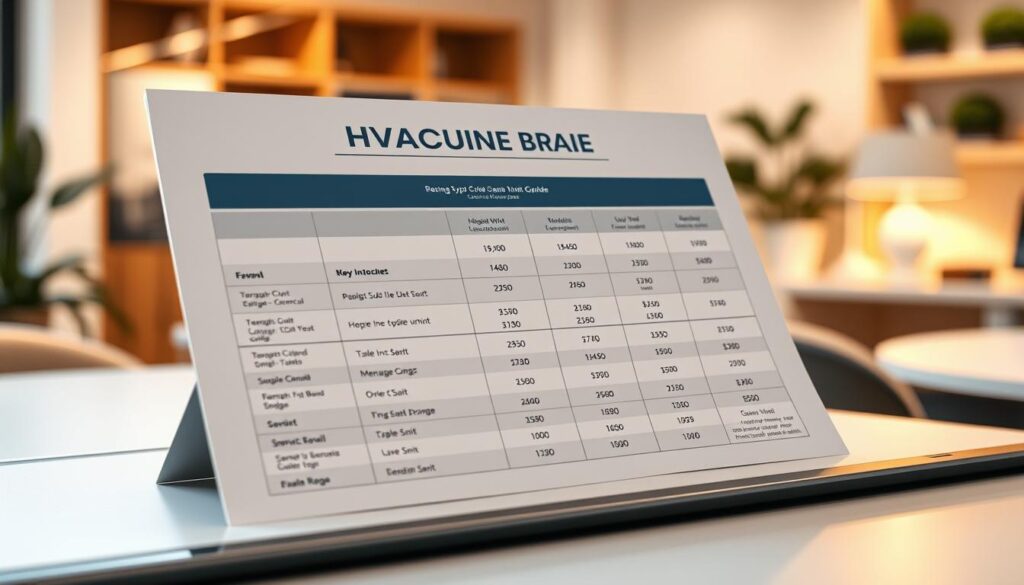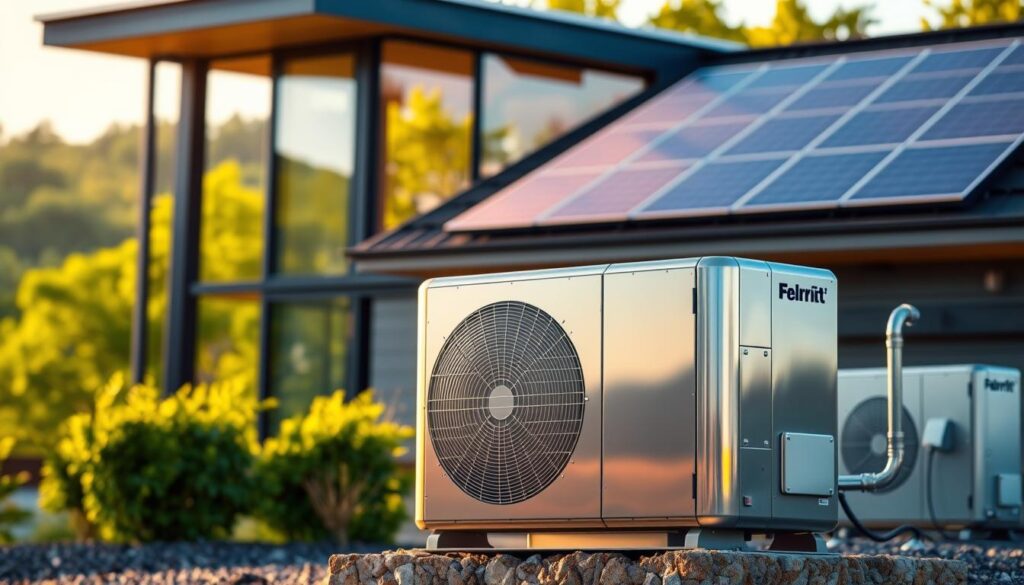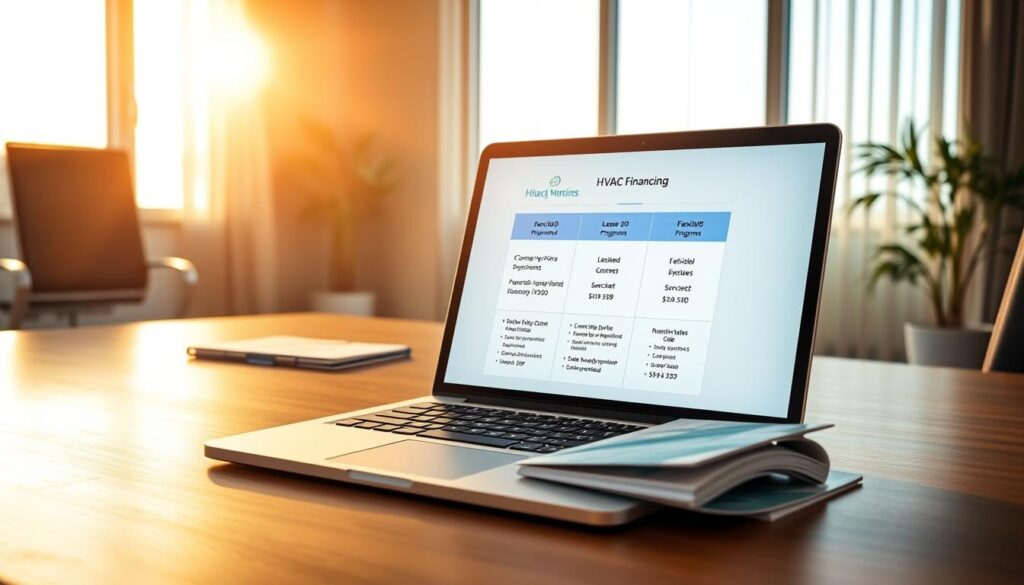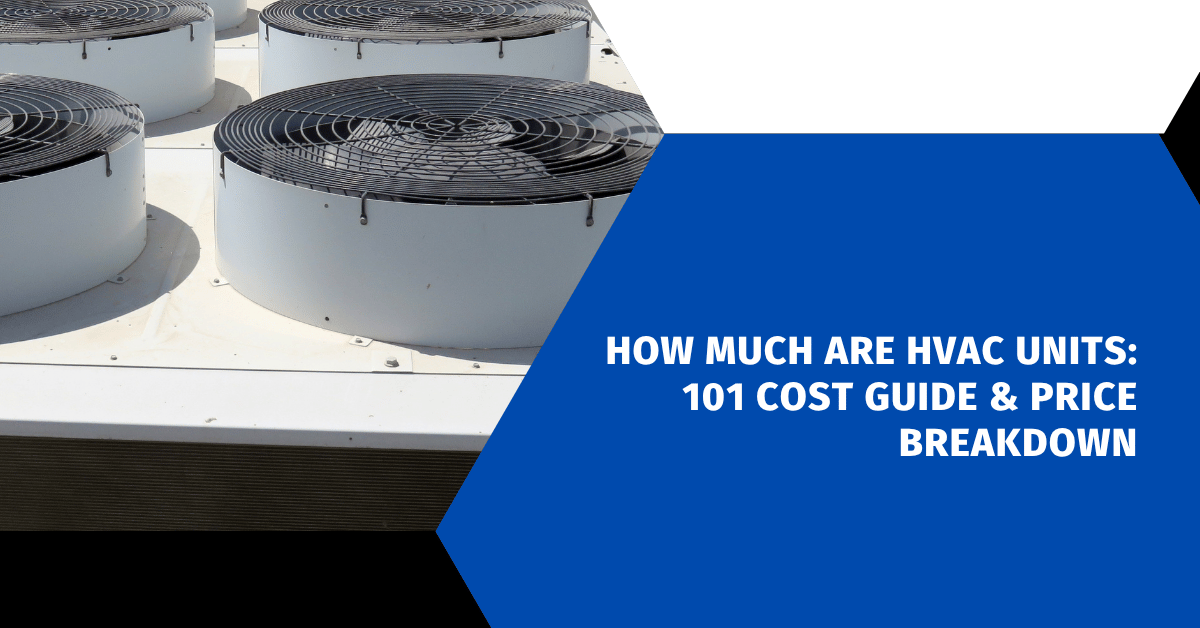Affiliate Disclosure
HVAC Guide Guys is a participant in the Amazon Services LLC Associates Program, an affiliate advertising program designed to provide a means for sites to earn advertising fees by advertising and linking to Amazon.
How Much Are HVAC Units? Are you curious about the cost of HVAC units and what affects their price? Knowing the real cost of heating, ventilation, and air conditioning systems can save you a lot of money.

HVAC units are a big investment for your home. Prices vary a lot based on different factors. On average, homeowners spend between $5,000 and $12,500 for a full system. Most standard setups cost around $7,500.
The price of your HVAC unit depends on several important things. These include your home’s size, the type of system, your local climate, and how hard it is to install. This guide will help you understand HVAC unit costs better. It will also help you make a smart choice.
Key Takeaways
- Average HVAC installation costs range from $5,000 to $12,500
- System type significantly impacts overall pricing
- Home size determines total installation expense
- Energy efficiency can influence long-term costs
- Professional installation is key for the best performance
Table of Contents
Understanding HVAC System Basics and Costs
Exploring residential hvac costs can be tricky. Your home’s comfort depends on picking the right HVAC system. It’s important to understand the pricing to make a smart choice.
Today’s HVAC systems offer many options for controlling your home’s temperature. Each has its own features and price, affecting your total cost.
Types of HVAC Systems Available
- Split System Air Conditioners
- Heat Pumps
- Packaged HVAC Systems
- Ductless Mini-Split Systems
- Geothermal Heat Pumps
Factors Affecting Initial Purchase Cost
Several elements play a big role in hvac costs:
- System efficiency ratings (SEER)
- Home square footage
- Local climate conditions
- Equipment brand reputation
- Advanced technological features
Average Price Ranges by System Type
| HVAC System Type | Average Cost Range | Best For |
|---|---|---|
| Heat Pumps | $4,200 – $8,000 | Moderate Climates |
| Furnaces | $1,700 – $10,000 | Cold Regions |
| Central AC Units | $3,900 – $7,900 | Warm Climates |
Choosing the right HVAC system is all about considering your home’s needs and your budget.
Explore Our HVAC Shop
Looking for top-rated HVAC tools, parts, and accessories? Visit our shop and find the perfect solution for your needs.
Visit the ShopHow Much Are HVAC Units: Complete Price Analysis
Exploring the cost of HVAC units reveals a wide range of prices. These prices vary based on several factors. Your budget can change a lot depending on the brand, efficiency, and features.
HVAC units are mainly divided into three price groups:
- Budget-Friendly Options: Entry-level units cost between $2,000-$5,000
- Mid-Range Systems: These units offer balanced performance for $5,000-$10,000
- Premium Brands: High-efficiency units cost $10,000-$15,000
Different manufacturers offer unique values for your money. Brands like Carrier, Lennox, and Trane are pricier but come with better technology and longer warranties.
| Brand Category | Average Cost Range | Efficiency Rating |
|---|---|---|
| Budget Brands | $2,000 – $5,000 | Standard (10-14 SEER) |
| Mid-Range Brands | $5,000 – $10,000 | Good (15-18 SEER) |
| Premium Brands | $10,000 – $15,000 | High (19-26 SEER) |
Remember, the total cost includes the unit price, installation, energy savings, and long-term performance. Evaluating these factors helps you make a smart choice for your HVAC budget.
Explore Our HVAC Shop
Looking for top-rated HVAC tools, parts, and accessories? Visit our shop and find the perfect solution for your needs.
Visit the ShopHVAC Installation Costs by Home Size
Understanding the cost of HVAC systems in homes starts with looking at home size. The size of your home greatly affects the cost of installing an HVAC system. Each home size has its own set of challenges and needs for HVAC installation costs.
Choosing the right HVAC system is important. It depends on your home’s size. Here’s a look at the costs for different home sizes:
Small Home HVAC Installation (Under 1,000 sq ft)
Small homes need special HVAC solutions that can save you money. For homes under 1,000 square feet, you can expect:
- Average installation costs: $3,000 – $6,000
- Smaller ductwork requirements
- Less complex system design
- Lower energy consumption
Medium Home HVAC Installation (1,000-2,000 sq ft)
Medium-sized homes need more detailed HVAC solutions. The costs for these homes usually fall in the following range:
| Cost Range | System Type | Typical Features |
|---|---|---|
| $6,000 – $10,000 | Split System | Moderate cooling/heating capacity |
| $8,000 – $12,000 | Heat Pump | Energy-efficient option |
Large Home HVAC Installation (Over 2,000 sq ft)
Bigger homes need more advanced HVAC systems. Residential hvac costs for large homes can be high:
- Installation costs: $10,000 – $15,000+
- Multiple zone systems
- Advanced temperature control
- Higher energy capacity requirements
The size of your home greatly affects the cost and complexity of HVAC installation. Getting a professional assessment is key to finding the most efficient system for your needs.
Brand Comparison and Price Ranges
When planning your hvac equipment budget, it’s key to know the different brands and their prices. The HVAC market has many options, from high-end to budget-friendly.
Premium brands like Carrier, Lennox, and Trane are at the top. They offer high hvac unit prices with advanced features and long warranties. You’ll pay more upfront but get:
- Highest energy efficiency ratings
- Advanced technology integration
- Extended warranty coverage
- Superior performance in extreme conditions
Mid-range brands such as American Standard, Bryant, Rheem, and Ruud offer a good balance. These brands provide reliable performance at more moderate price points. They’re great for homeowners who want quality without spending too much.
For those on a tight budget, look at Goodman, Amana, and Coleman. These brands have lower initial prices but offer reliable cooling and heating for many homes.
Tip: Don’t just focus on price. Consider long-term energy efficiency, maintenance costs, and performance when selecting your HVAC system.
Your specific needs, local climate, and home size will help choose the best brand for your budget. Talking to a professional can guide you better.
Explore Our HVAC Shop
Looking for top-rated HVAC tools, parts, and accessories? Visit our shop and find the perfect solution for your needs.
Visit the ShopLabor and Installation Cost Breakdown
When planning your HVAC system, knowing the labor and installation costs is key. These costs can change a lot based on several important factors. These factors affect the total cost of your project.
Average Labor Rates for HVAC Technicians
HVAC system pricing for labor usually falls between $75 and $150 per hour. The rates technicians charge depend on:
- Where you live
- The technician’s experience
- How complex the installation is
- Local market rates
Installation Timeline and Process
The HVAC installation process has several steps that affect both time and cost. A typical home installation takes 1-3 days. This depends on your home’s needs.
| Installation Stage | Estimated Time | Cost Impact |
|---|---|---|
| Initial Assessment | 2-4 hours | Low |
| Equipment Removal | 2-3 hours | Medium |
| New System Installation | 6-12 hours | High |
| Testing and Calibration | 1-2 hours | Low |
Additional Installation Expenses
There are extra costs to consider beyond just labor. These include:
- Permit fees ($50-$300)
- Ductwork changes
- Upgrades to the electrical system
- Getting rid of old equipment
Knowing these costs helps you plan your HVAC system investment better. It also helps you avoid any surprise expenses.
Energy Efficiency and Long-term Cost Savings

Choosing cost-effective HVAC options can cut down your energy bills over time. High-efficiency systems save money that goes beyond the initial cost. They help homeowners lower their monthly utility bills.
It’s important to know about energy efficiency ratings when picking affordable HVAC solutions. Look at these key metrics:
- SEER (Seasonal Energy Efficiency Ratio)
- AFUE (Annual Fuel Utilization Efficiency)
- HSPF (Heating Seasonal Performance Factor)
A high-efficiency HVAC system can save you 20-40% on heating and cooling costs. Smart technologies like programmable thermostats and zoning systems help manage energy better. They allow for precise temperature control and less waste.
Energy-efficient systems also come with financial perks. The federal government and many state programs offer:
- Tax credits for energy-efficient upgrades
- Rebates on high-performance HVAC equipment
- Utility company incentive programs
When looking at cost-effective HVAC options, think about the total cost over time. High-efficiency systems might cost more upfront. But, the long-term savings can make up for it.
“Investing in energy efficiency is not an expense, but a strategy for future savings.” – Energy Conservation Expert
HVAC Replacement vs New Installation Costs
Choosing between HVAC replacement and a new installation is tough for homeowners. Your decision affects both upfront costs and long-term comfort. Knowing the differences helps you invest wisely in your home’s heating and cooling.
When to Replace Your Current System
Knowing when to evaluate hvac installation costs is key. Look for these signs that your system needs a new one:
- System age over 10-15 years
- Frequent costly repairs
- Inconsistent room temperatures
- Rising energy bills
- Unusual noises or strange odors
Cost Differences Between Replacement and New Installation
HVAC replacement costs $4,000 to $12,000. New installations can be $6,000 to $12,500. Prices vary based on:
- Existing Infrastructure: Replacement is often cheaper because of existing ductwork and electrical connections
- System Complexity: More complex systems, like multi-zone or high-efficiency ones, cost more
- Home Size: Bigger homes need more powerful, expensive systems
Consider your options carefully. Sometimes, a new installation offers better energy efficiency and lower maintenance costs than fixing an old system.
Explore Our HVAC Shop
Looking for top-rated HVAC tools, parts, and accessories? Visit our shop and find the perfect solution for your needs.
Visit the ShopFinancing Options and Payment Plans

Getting affordable HVAC solutions doesn’t have to be expensive. There are many financing options to help manage your budget. Knowing about these plans can make upgrading your home’s comfort easier.
Most HVAC makers and local contractors offer flexible financing plans. These plans help homeowners pay over time. You can choose from:
- Manufacturer-sponsored financing programs
- Personal home improvement loans
- Credit card promotions
- Home equity lines of credit
When looking at financing, keep these points in mind:
- Interest rates
- Repayment terms
- Promotional periods
- Qualification requirements
Many companies offer zero-percent interest promotions for certain customers. This lets you get energy-efficient systems without paying all at once.
| Financing Option | Average Interest Rate | Typical Term Length |
|---|---|---|
| Manufacturer Financing | 4.9% – 12.9% | 12-60 months |
| Personal Loans | 6% – 15% | 24-84 months |
| Home Equity Loans | 3% – 8% | 60-180 months |
Your credit score is key in getting financing. Better credit scores mean lower interest rates and better terms for your budget.
Pro tip: Always read the fine print and understand all terms before committing to any financing plan.
Conclusion
Choosing the right HVAC system is a big decision. It depends on your home’s size, needs, and energy efficiency. Most people spend between $5,000 to $12,500 for a system that keeps them comfortable.
Looking for affordable HVAC options means more than just the price. Think about the long-term savings and reliability. Even though high-efficiency units cost more upfront, they save money on bills and control the temperature better.
Getting advice from experts is key when buying an HVAC system. Get quotes from trusted contractors and compare systems. This way, you’ll make a choice that saves money and makes your home more comfortable.
A good HVAC system is more than just a purchase. It’s a big investment in your home’s comfort and energy use. Take your time to choose wisely, focusing on quality and efficiency over the cheapest option.

